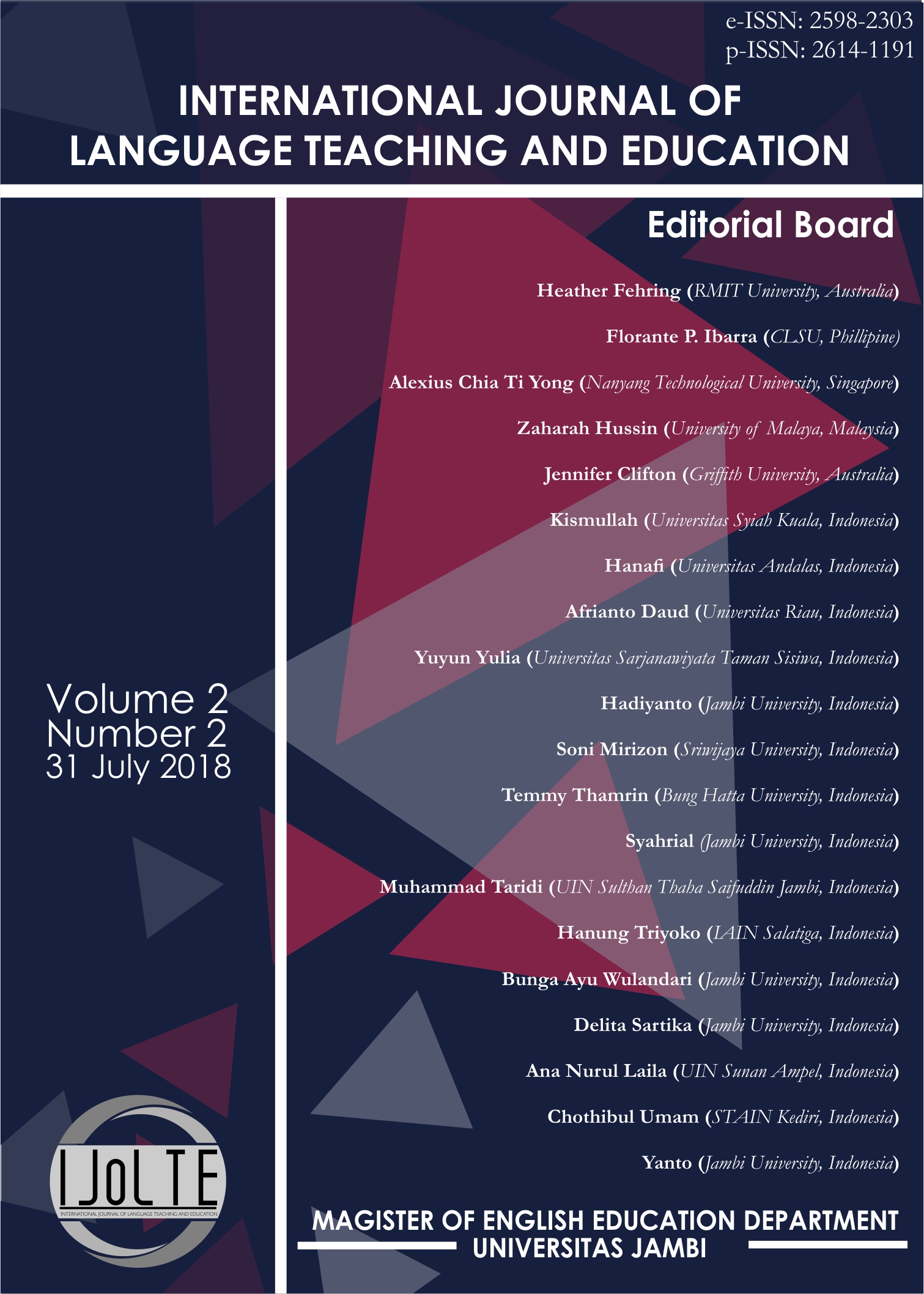Emotional Geographies of an EFL Teacher in Asmat, Papua; Male Perspective
DOI:
https://doi.org/10.22437/ijolte.v2i2.5204Keywords:
culture, emotional geographies, EFL Teacher, rural area, teacher emotionAbstract
Teaching is not only about knowledge, cognition, and skill but also emotional relationships among the students, colleagues, and parents. Particularly for teaching English in rural areas in Indonesia, there are several challenges that should be handled: geographical feature of these area, their culture and the way of life, the quality of both students and teachers, and so on. This research paper investigates teacher emotions experienced by a male EFL teacher in one of rural areas while dealing with those challenges. Teacher emotions are one of significant aspect that could not be left behind in teaching and learning activity. This research will explore comprehensively the distance and closeness felt by the teacher while teaching English there. This qualitative research was conducted using a narrative case study approach. The data were collected from the participant’s journal and interview. Referring to Hargreaves framework, the findings reveal 5 emotional geographies of the participant. This research contributes to Indonesian government as the one that concerns in 3T areas, EFL teachers who have to handle complex situations while teaching, and other researchers who are interested in conducting emotional geographic research.
Downloads
References
[2] Hargreaves, A. (2000). Mixed emotions: Teachers’ perceptions of their interactions with students. Teaching and Teacher Education, 16(8), 811-826.
[3] Hargreaves, A. (2001). The emotional geographies of teachers’ relations with col-leagues. International Journal of Educational Research, 35(5), 503-527.
[4] Hargreaves, A. (2005). Educational change takes ages: Life, career and genera-tionalfactors in teachers’ emotional responses to educational change. Teaching and Teacher Education, 21(8), 967-983.
[5] Liu, Y. (2016). The emotional geographies of language teaching. Teacher Develop-ment, 20(4), 482-497.
[6] Zembylas, M. (2007). Theory and methodology in researching emotions in educa-tion. International Journal of Research & Method in Education, 30(1), 57-72.
Downloads
Published
Versions
- 2018-08-01 (1)
- 2018-08-01 (1)
How to Cite
Issue
Section
License
The Authors submitting a manuscript do so on the understanding that if accepted for publication, copyright of the article shall be assigned to International Journal of Language Teaching and Education (IJoLTe) and Magister Program of English Education Department, Universitas Jambi as publisher of the journal. Copyright encompasses rights to reproduce and deliver the article in all form and media, including reprints, photographs, microfilms, and any other similar reproductions, as well as translations.
IJoLTe keep the rights to articles that have been published. And, the authors are permitted to disseminate published article by sharing the link of IJoLTe' website. Authors are allowed to use their works for any purposes deemed necessary without written permission from IJoLTe with an acknowledgement of initial publication in this journal.
IJoLTe and Magister Program of English Education Department, Universitas Jambi, and the Editors make every effort to ensure that no wrong or misleading data, opinions or statements be published in the journal. In any way, the contents of the articles and advertisements published in IJoLTe are the sole and responsibility of their respective authors and advertisers.
If the article was jointly prepared by more than one author, any authors who submitting the manuscript warrants that he/she has been authorized by all co-authors to be agreed on this copyright and license notice (agreement) on their behalf, and agrees to inform his/her co-authors of the terms of this policy. IJoLTe will not be held liable for anything that may arise due to the author(s) internal dispute. IJoLTe will only communicate with the corresponding author.
By submitting the article/manuscript to this journal, the authors agree with this policy and consciously agree that IJoLTe does not provide royalties or other fees to the authors for their published articles. By agreeing this policy, IJoLTe ensures that published articles are publicly accessible and will be free of charge for the readers. No specific document sign-off is required.
Users of this website will be licensed to use materials from this website following the Creative Commons Attribution 4.0 International License. Please use the materials accordingly
You are free to:
- Share — copy and redistribute the material in any medium or format
- Adapt — remix, transform, and build upon the material for any purpose, even commercially.
- The licensor cannot revoke these freedoms as long as you follow the license terms.








1.png)
